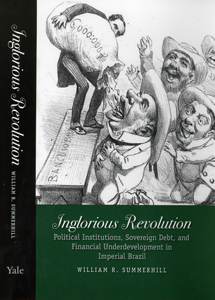
Inglorious Revolution: Political Institutions, Sovereign Debt, and Financial Underdevelopment in Imperial Brazil
Government debt crises are a fact of political and economic life. The costs of government default are often severe. Nowhere has this been more clearly demonstrated than in Latin America. By the middle of the 19th century most Latin American states had become what modern scholars have labeled “serial defaulters.”
William Summerhill shows that Imperial Brazil (1822-1889) was an exception. Much as they did in Britain more than a century before, the political institutions of constitutional monarchy provided an effective penalty for default in Brazil, which in turn credibly committed the government to repay its debts. Beginning in the 1820s bankers in London structured Brazil’s loans in sterling, and merchants and slave traders in Rio de Janeiro were willing to lend in local currency. The parliament always budgeted funds to service its loans. The result was continuous access to capital markets. While most Spanish American governments repeatedly defaulted, Brazil’s bondholders on both sides of the Atlantic always received their interest payments. This achievement constituted nothing less than a revolution in public finance.
Given Imperial Brazil’s enviable record of government borrowing, it should have also experienced a broad-based revolution in private finance. Summerhill shows that it did not. Restrictive and arbitrary controls over incorporation, and regulatory barriers to entry by banks, created financial underdevelopment. The same political institutions that fostered credible public finance stymied innovation in private capital markets. In terms of its consequences for financial development, Brazil’s rupture with absolutist government at independence was an inglorious revolution.

